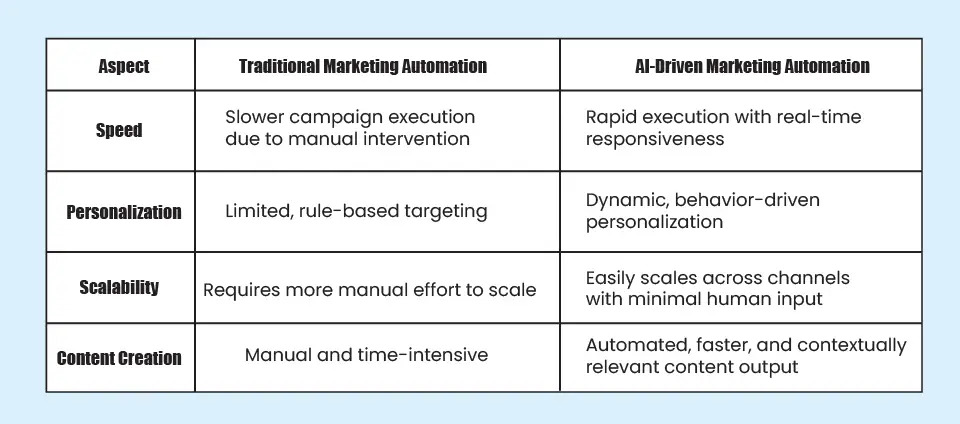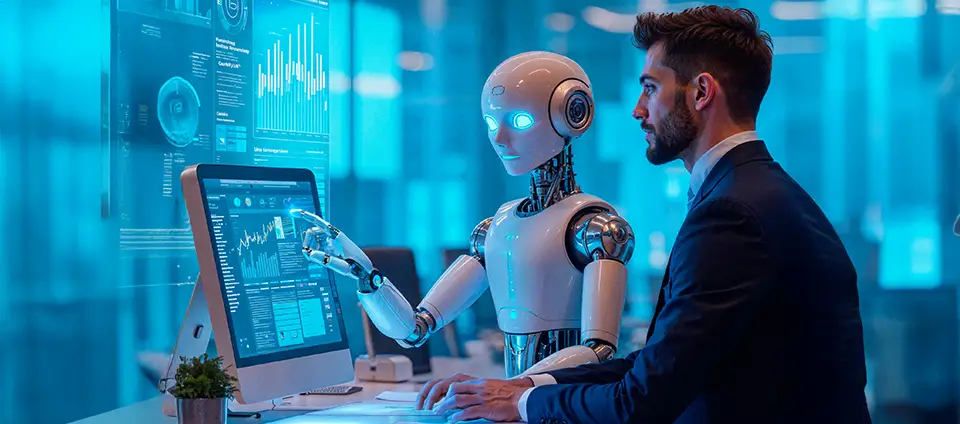Everything About Generative AI in Marketing Automation
The landscape of digital marketing is evolving at lightning speed, and Generative AI in marketing automation is steering that transformation. Businesses today are no longer asking whether to adopt artificial intelligence - they’re asking how quickly they can integrate it.
From content creation to customer engagement, the benefits of intelligent automation are reshaping marketing strategies. And with 74% of forward-thinking companies already leveraging Generative AI development, this technology is rapidly becoming essential to staying competitive.
At the heart of this revolution is the growing role of AI development companies that build tailored solutions designed to unlock efficiency, personalization, and innovation at scale.
Let’s explore how Generative AI is not only redefining how marketing works but why your business should pay close attention.
Why Generative AI in Marketing Automation Matters
Modern marketing demands more than just data-driven decision-making - it requires real-time personalization, intelligent execution, and content that resonates on a human level. That’s where Generative AI in marketing automation steps in.
These technologies automate repetitive tasks, generate compelling messaging, and enhance campaign performance with unprecedented speed and accuracy. As companies race to adopt these tools, the need for reliable AI software solutions becomes critical.
Key Benefits:
- Increased Efficiency
AI accelerates content creation, data analysis, and campaign deployment. Businesses gain a faster go-to-market advantage and reduce operational costs significantly. - Advanced Personalization
By analyzing real-time data, artificial intelligence development crafts customized messages and follow-ups that feel uniquely human. This fosters higher engagement and strengthens customer relationships. - Scalable Marketing Operations
Whether you're targeting thousands or millions, AI software solutions scale with ease - enabling small teams to run expansive, multi-channel campaigns without added overhead.
Traditional vs AI-Driven Marketing Automation

The Mechanics Behind Generative AI
What makes Generative AI truly powerful is its ability to simulate human-like creativity. These systems are trained using deep learning models, analyzing huge datasets to create content that feels authentic and personalized.
Whether it’s drafting emails, creating ad copy, or recommending content, Generative AI works by:
1. Deep Neural Network Pattern Recognition: Advanced generative models rely on deep neural networks to process a wide array of structured and unstructured data. These networks identify recurring patterns and intricate connections across datasets, which is foundational to crafting intelligent marketing outputs.
2. Learning from Large-Scale Datasets: Through exposure to millions of data points, generative models learn to generate relevant, impactful, and context-sensitive content. This deep learning enables rapid content generation aligned with specific campaign goals.
3. Instant Content Personalization: Once trained, the models generate tailored marketing content in real time - ranging from emails and product recommendations to full ad campaigns - based on each customer’s behavior and preferences.
4. Integration into Operational Workflows: With support from AI integration services or Generative AI consulting, businesses can incorporate generative models into existing marketing systems, ensuring efficient and scalable operations.
The best part? AI now allows marketers to execute these processes in seconds rather than hours.
93% of marketers say AI helps them produce content faster, and 90% use it to make smarter decisions. These numbers reflect how vital AI integration services have become in marketing workflows.
From Strategy to Execution: Implementing GenAI the Right Way

Adopting Generative AI isn't about flipping a switch - it's about a well-planned rollout. For companies new to this technology, implementing Generative AI development for marketing automation can appear complex. However, breaking it into manageable steps makes adoption achievable - even for non-technical teams. Leading AI software development companies recommend a phased approach to integrating GenAI into marketing automation.
Step-by-Step Approach:
1. Set Clear Objectives
Define specific goals - whether it's enhancing personalization, increasing conversions, or boosting campaign speed. Clear targets guide the integration of the generative approach.
2. Select the Right AI Tools
Choose platforms and tools aligned with your business needs. Collaborating with an experienced AI development company can help assess and recommend the best solutions that seamlessly integrate with your existing infrastructure.
3. Gather and Integrate High-Quality Data
Successful outcomes hinge on rich data. Merge customer behavior data, social media insights, and web analytics into your generative AI platform for more accurate and personalized content outputs.
4. Conduct Pilot Campaigns
Run test campaigns to validate performance. Fine-tune the model based on initial results to ensure reliable efficiency and relevance.
5. Expand and Continuously Optimize
Once proven, scale usage across all marketing channels. Ongoing support from a trusted AI software development company or Generative AI consulting firm ensures continued growth and innovation.
The goal is not just implementation - it’s sustainable adoption. And that’s where a reliable AI development company becomes your best partner.
Use Cases: Where Generative AI Shines
Real-world applications of Generative AI development are multiplying. Let’s explore a few marketing automation tasks where GenAI is already delivering transformative outcomes.
1. Content Creation at Scale
Whether it’s newsletters, blogs, product descriptions, or social captions - AI tools generate these in minutes. Better yet, they optimize tone, format, and content based on audience preferences.
2. Dynamic Email Campaigns
AI-powered emails now feature real-time personalization. Subject lines, images, offers - all adjusted according to recipient behavior and past interactions.
3. Customer Support & Chatbots
Many companies use GenAI to automate customer queries, offering 24/7 support with human-like empathy. These systems are capable of learning and adapting with each interaction.
4. Predictive Analytics
AI predicts what content or offers a customer is likely to engage with next, enabling real-time decision-making that drives better results.
5. Product Recommendations
Like Netflix or Amazon, your business can use AI software solutions to surface relevant recommendations based on customer behavior.
The possibilities only expand when you partner with an experienced AI development company that understands your industry.
The Role of AI Consulting & Execution Support

The implementation of Generative AI in marketing automation is not just about integrating smart tools into existing workflows - it's a strategic transformation that demands expertise, precision, and alignment with broader business goals. This is where AI consulting and execution support become indispensable.
While the technology behind Generative AI development is advancing rapidly, its real value emerges when it is tailored to the unique operational context of each organization. From initial strategy formulation to ongoing optimization, the right consulting partner plays a pivotal role in unlocking the full potential of AI software solutions in marketing.
1. Strategic Alignment and Roadmapping
A trusted AI development company brings industry perspective and technical know-how to design a roadmap that aligns AI capabilities with the company's marketing vision. This includes:
- Identifying high-impact use cases for Generative AI in marketing automation
- Setting measurable KPIs tied to both marketing and business outcomes
- Building phased implementation plans that mitigate risk while maximizing ROI
This strategic layer ensures that artificial intelligence development efforts are not siloed experiments but foundational drivers of brand growth and operational agility.
2. Technology Evaluation and Custom Integration
Choosing the right platforms, models, and architecture for AI integration services can be overwhelming - especially with the rapid evolution of tools and frameworks. AI consulting firms provide clarity by:
- Evaluating market-leading AI software development company offerings based on specific business needs
- Ensuring interoperability with current martech stacks and CRM ecosystems
- Customizing AI models to reflect your brand voice, customer segmentation logic, and compliance requirements
This step ensures that implementation is not only technically sound but also scalable, secure, and aligned with enterprise standards.
3. Operational Enablement and Training
For AI software solutions to deliver long-term value, marketing teams need the ability to use, adapt, and innovate with these tools. Consulting partners facilitate this by:
- Delivering hands-on training programs tailored to marketers, content creators, and analysts
- Establishing internal governance structures to manage AI usage responsibly
- Providing ongoing support to refine prompts, optimize outputs, and update models based on performance feedback
This layer of execution support turns marketing teams from AI users into AI-enabled innovators - equipped to iterate fast, test intelligently, and personalize at scale.
4. Compliance, Ethics, and Responsible AI Use
As AI becomes integral to customer engagement, ensuring ethical use and regulatory compliance is paramount. Leading Generative AI consulting services address this by:
- Conducting AI risk assessments and bias audits
- Implementing data privacy safeguards in accordance with global standards (e.g., GDPR, CCPA)
- Advising on responsible AI practices in content creation, personalization, and targeting
By embedding ethics and compliance into the AI lifecycle, consulting partners help brands build trust with customers and stakeholders - an often overlooked yet critical success factor in AI-driven marketing.
5. Continuous Optimization and Innovation
The deployment of Generative AI for marketing is not a “set-and-forget” solution. It requires continuous refinement, informed by real-world performance and evolving customer behavior. Consultants support this through:
- Periodic audits of AI model performance and content effectiveness
- A/B testing of personalized campaigns and generative outputs
- Incorporation of new Generative AI development updates and emerging techniques
This ongoing partnership ensures that marketing AI systems remain relevant, competitive, and adaptable in a fast-changing digital landscape.
What’s Next: Future Trends in AI Marketing
As Generative AI continues to evolve at a rapid pace, its role in marketing is moving beyond experimentation to become a central force in how brands operate, engage, and scale. The convergence of GenAI with other emerging technologies is not just driving automation - it’s redefining creativity, personalization, and the very fabric of customer experience.
For marketing leaders, staying ahead of these trends isn't optional - it’s critical for maintaining relevance, competitiveness, and market leadership in an increasingly digital-first world.
1. Synergizing GenAI with Emerging Technologies
The future of Generative AI for marketing lies in its ability to interface seamlessly with a broader ecosystem of disruptive innovations. We’re witnessing the early stages of integration between GenAI and technologies like augmented reality (AR), blockchain, and immersive virtual experiences - and this convergence will reshape how brands create, deliver, and personalize content at scale.
Key trajectories include:
- Augmented Reality & Mixed Media Campaigns
By merging GenAI with AR, marketers will be able to craft highly immersive campaigns where users interact with content layered over real-world environments. Imagine virtual product try-ons or dynamic brand storytelling experiences - all auto-generated and personalized in real-time.
- Immersive Virtual Environments
Virtual spaces powered by GenAI can facilitate personalized brand interactions in 3D, gamified environments. These spaces will serve as next-gen showrooms, event hubs, or experiential marketing zones - driven by real-time customer data and adaptive content generation.
- Blockchain for Data Transparency & Trust
The intersection of AI software solutions and blockchain promises secure, auditable, and decentralized data management. This will be key in fostering trust, especially as AI-driven personalization becomes more complex. Transparent data trails, token-based loyalty systems, and AI-powered smart contracts could soon become core components of marketing automation.
2. Expert Forecasts: GenAI as a Competitive Imperative
Industry analysts and AI experts predict that Generative AI will soon be foundational to enterprise marketing strategies - powering everything from content pipelines to campaign orchestration.
Strategic projections include:
- Market Differentiation Through Early Adoption
Businesses that embed GenAI into their core marketing stack today will be tomorrow’s leaders. These early movers are gaining capabilities in speed, creativity, and personalization that traditional systems simply can’t match.
Algorithmic Advancements Redefining Creativity
As Generative AI development advances, we’re approaching a world where machines co-create with marketers - generating ideas, refining messaging, and even adapting tone and emotion based on audience feedback. The result: content that resonates deeply while being produced faster and more cost-effectively.
- Rising Demand for Expert Consulting
The complexity of these emerging ecosystems necessitates expert Generative AI consulting. From ethical guardrails to technical execution, AI consultants will be essential in helping brands extract value, mitigate risks, and future-proof their marketing investments.
3. What to Expect: Next-Generation Marketing Powered by GenAI
As GenAI becomes more embedded in enterprise operations, the marketing function itself will be reshaped - becoming more agile, intelligent, and user-centric.
Key future-forward capabilities include:
- Deeper Integration Across Systems and Functions
Expect tighter interoperability between GenAI and analytics, design, CRM, and automation tools. Unified systems will empower real-time feedback loops where creative, data, and delivery converge to form campaigns that adapt instantly to changing customer behavior.
- Smarter, Hyper-Personalized Content at Scale
GenAI will take content creation from batch-and-blast to hyper-relevant storytelling. Leveraging user preferences, behavioral signals, and contextual data, AI will generate on-brand messaging and visuals tailored to each stage of the customer journey - across platforms and channels.
- Elevated Engagement Through Two-Way Interactions
The future of engagement lies in conversational AI, dynamic experiences, and interactive storytelling. With AI software development evolving rapidly, brands will be able to craft real-time, bidirectional customer interactions that deepen relationships and increase retention.
4. Why These Trends Matter for Your Business
Adapting to these trends is more than a technological upgrade - it’s a strategic evolution in how your brand thinks, creates, and connects. Implementing Generative AI in marketing automation empowers your teams to:
- Shift from reactive to predictive marketing
- Deliver value faster through intelligent automation
- Make smarter, data-informed creative decisions
- Elevate customer experiences beyond personalization - to anticipation
Embracing Generative AI development is a decision to lead, not follow. It unlocks new levels of creativity, operational efficiency, and strategic agility. In a future where change is the only constant, Generative AI consulting and integration services will be key in navigating complexity
Final Thoughts
Generative AI in marketing automation is more than a trend - it’s the new foundation of effective marketing. From rapid content creation to real-time personalization, AI is changing how businesses engage, convert, and retain customers.
Whether you’re starting with a single campaign or looking to overhaul your entire marketing strategy, now is the time to explore AI integration services and partner with a trusted AI software development company.
Success in tomorrow’s marketplace will be determined by how intelligently and strategically you embrace artificial intelligence development today.



